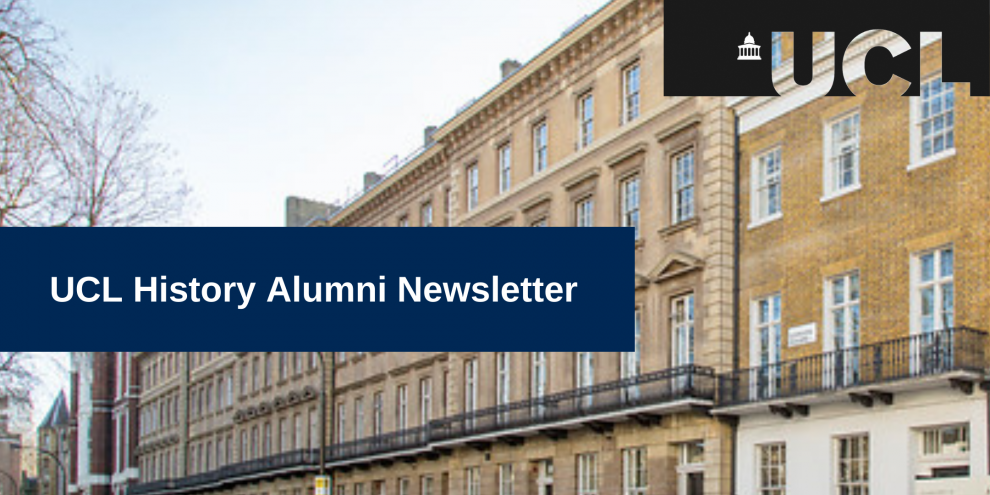
Contents
Welcome
Spotlights
- Dr David Sim: Spotlight on Teaching
- Dr Tom Penfold: Spotlight on Research
- Professor John Sabapathy: Spotlight on Research
- Lapis Student Zine: Spotlight on Students
- A Week in the Life of a UCL History Student: Spotlight on Students
- Jeremy Bowen: Spotlight on Alumni
- Angela Leaney: Spotlight on Alumni
- Antonia Fitzpatrick: Spotlight on Alumni
Spotlight on Selected Recent Publications in the Department
- Staff Publication: Royal Childhood and Child Kingship: Boy Kings in England, Scotland, France and Germany, c. 1050–1262 by Emily Joan Ward
- Alumni Publication: Heritage Weekends: 52 breaks exploring Britain’s past by Neil and Helen Matthews
Reflections
Recent & Upcoming Events
- May 2022 Alumni Event: UCL Historians on Disease and History
- Upcoming Events in the 2022-23 Academic Year
Welcome
Professor Eleanor Robson: A Year in the Life of the Head of Department
For the most part, students don’t get to see much of the Head of Department, or HoD, as the post is known to staff. So I thought it would be interesting to give you a HoD’s-eye view of UCL History in its second-most challenging year in living memory. (No prizes for guessing that the most challenging one was 2020-21!)
Heads of Department are appointed from amongst the senior academic staff to serve for 3–5 years. I’m at the end of my fourth. Our role is mostly at one remove from students, which is why you probably didn’t see much of me or my predecessors, except if we happened to teach you. We mostly support departmental colleagues to do their jobs as effectively as possible, and take care of policy, strategy, planning and formal reporting. All told, I’m responsible for about 1000 people: the academic, professional services, research and teaching staff of the Department—just under 100 of them—and over 900 students. If you’re thinking that that sounds like a lot, it is. And it wasn’t quite meant to be that way…
The HoD’s academic year begins in August, with the announcement of school-leavers’ A-Level results. This gives a strong steer on how many new undergraduates will be accepting conditional offers to start studying with us in September. Pre-pandemic, UCL History’s normal intake was just under 200. Because of successive ad-hoc replacements to Covid-affected A-Level exams, in 2020 it rose to 240, and in 2021 to a little over 300. So, for the second year running, I spent the late summer planning for a supersized first-year cohort, scaling up modules, ensuring we had enough teaching space, recruiting new staff, etc. — and then discovering we were getting 50% more MA students than expected too! Everyone involved coped fantastically with this sudden abundance.
So somehow it all worked, and — give or take a few small wobbles in September — it was a true delight to celebrate the return of most face-to-face teaching in the new academic year. Staff and students alike were energized and grateful to be back together, though the ability to hop online when needed was also much appreciated, especially as Omicron began to pick up momentum at the end of Term 1. I’ll draw a veil over the impact of the History Society Ball in early December, except to say that we Zoomed for the remaining week of term...
Planning for UCL History’s huge and complex teaching programme always takes a lot of the winter months. This year I also had to allow for (at least) 170 extra students, all taking small-group seminars. It simply wasn’t going to be logistically possible to fit all the extra seminars onto the timetable or into the available teaching space, or ethically comfortable to appoint yet more temporary staff to cope with the extra teaching and assessment. Fortunately, we were rescued by Goldsmiths History Department, with whom I negotiated a 3-year module-sharing agreement, based on our longstanding intercollegiate partnership. The deal also saved several at-risk academic jobs there, though sadly not all of them. Some 60–70 UCL History undergrads have chosen to take options at Goldsmiths next year, in all sorts of fascinating subjects that are beyond our own expertise. I’m excited!
This academic year I’ve also been supporting an important student-led research project called Mind the Gap! Last year, data analysis of UCL History’s pre-pandemic degree results showed, shockingly, that we had been awarding Firsts to around 40% of our UK students who identify as White, but to only 20% or so to those who identify as Black, Asian, mixed heritage, or other. This so-called Awarding Gap has complex causes, both within and beyond the Department and UK education more broadly: have a look at the Royal Historical Society’s work on race and ethnicity in the discipline if you would like to know more about this background. If you would like to see how our first-rate team of paid student interns set about researching the roots of the Awarding Gap within the Department, check out their new Zine, The Lapis. I am currently integrating their first tranche of recommendations into planning for next academic year. We’ll be continuing to crunch the numbers on module and degree results, and tracking students’ senses of belonging and support, for at least two more years.
Over the past few years we’ve been quietly revamping our MA offerings. Post-Brexit recruitment to MA European History and MA Transnational Studies both tumbled, so sadly these programmes have now closed. Instead, a brand new MA History offering launches this September, in which students choose to specialize in one of four pathways: culture, ideas and identities; empires and global history; environment, state and economy; and modern British history. At the same time, the first students studying MA Public History will arrive at the shiny new UCL East campus on the former Olympic park in Stratford. I’m greatly looking forward to seeing both programmes flourish.
A larger student body, and new programmes, have meant a significant increase in the Department’s staff. This year we have welcomed seven new teaching lecturers and academics: Drs Aaron Graham, Simon MacDonald, Anna Maguire, Tom Penfold, Mitch Robertson, and, for 2021–22 only, Drs Helene Maloigne and Grace Redhead. We’ve also been joined by five new research associates: Drs Parsa Daneshmand, Domenico Giordano, Lauren Lauret, James Morris, and Sophie Pitman—who is already leaving us to become Director of Research and Textile Specialist at the University of Wisconsin Madison: congratulations! Our professional services team has been strengthened by Syed Ahsan, Taran Baraganwath, Ariella Ben-David, Beth Campbell, Rima Cranston-Jones. Our all-important Departmental Tutor role has been filled first by Dr Leonie James and now Dr Jessica Davidson while Cari Tuhey is on extended maternity leave. Do look at the people pages on our website to find out more about these fantastic folk.
We’ve also been saying a sad farewell and thank you to four much-loved colleagues who may have taught you. Dr Tim Gibbs, who came to the Department in 2014 as Lecturer in African History, is about to take up a lectureship at Nanterre University (Paris X). Dr Will Selinger, who joined us four years ago from Harvard as Lecturer in European History, 1700–1850, becomes the Wick Cary Professor in Constitutional Studies at the University of Oklahoma. Dr Emily Ward, British Academy Postdoctoral Research Fellow since January 2021, is off to the University of Edinburgh as Lecturer in Medieval Scottish History. And Dr Keren Weitzberg, a Lecturer (Teaching) at UCL History and a Visiting Research Fellow at the UCL Institute of Advanced Studies since 2017, has been appointed to a senior lecturership in the School of Politics and International Relations at Queen Mary University of London. I’m delighted for all of them and wish them well!
I write this right at the end of term, the day before the last exam boards of Term 3, hoping for a much less eventful Departmental summer than last year! I might even get some research done over the next few months if all goes well. But there’s much to enjoy in HoD-life, and a thriving History Department to feel very proud of. I do hope you feel the same.
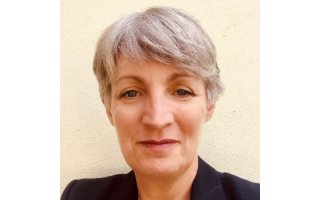
Eleanor Robson
Head of UCL History, 2018–23
Professor of Ancient Middle Eastern History
Spotlights: Teaching, Research, Students & Alumni
Dr David Sim: Spotlight on Teaching
This year saw the welcome return of face-to-face teaching after a year that was almost wholly taught online. 2020/21 had demanded various innovations in teaching, including new technologies and new approaches to building learning communities. We became more familiar than many of us would have liked with Microsoft Teams and reworked our modules so that students could complete them remotely. For research projects, including dissertations, this was quite the challenge, but in many ways an interesting and exciting one that taught us much about the possibilities of digital learning and online resources that we had previously underexplored. Many of the innovations that we made are likely here to stay and, among the stresses and strains, colleagues found much to appreciate in the novel changes that pandemic teaching demanded. Jon Chandler, convenor of the undergraduate core modules and our Faculty lead for all things innovative in teaching platforms, deserves a special shout-out here for his fantastic work in making sure that we knew what tools we had at our disposal and how we might best use them. We couldn’t have navigated the year without his sage guidance.
For all these innovations, however, students and staff alike were pleased to be back in the classroom this year for old-school seminar discussions, and a challenge for the years ahead will be integrating best practice that emerged during the covid emergency with the tried and tested models of the past. The spontaneity and layering of conversations that come with in-person teaching have been as rewarding as ever; our online year served as a reminder not to take for granted the joy of talking History in a room with smart people. As ever – and as banal as it sounds – the key to great teaching in History is hiring excellent historians who are also great teachers, and we are blessed to have plenty of folks who are both. This year colleagues scooped up another eight nominations across the Student Choice Awards – in which students nominate staff for awards in various teaching and supervisory categories – and the UCL Education Awards. We also excelled in College’s annual audit of teaching though, as ever, there is work to be done. We continue to work to address awarding gaps, better support students from non-traditional backgrounds, and diversify both our curriculum and the way that we teach and assess our students.
We continue to expand the Department’s offering, and this autumn Dr. Anna Maguire and Dr. Mark Frost will launch our new MA in Public History. It has been a labour of love – and an education in the mechanics of UCL as a behemoth of an institution – but they have developed an incredibly impressive offering, drawing on in-house expertise, exciting external partnerships, and the rich opportunities presented by our London location.
For all the positivity in the above, this is an unhappy time in UK Higher Education in many respects. Historians at other institutions are facing redundancy, and the sector at large is subject to some pretty nasty financial and political crosswinds. We know we can’t just keep our heads down and hope that things shake out alright for us at UCL: the dismantling of our pensions earlier this year tells us that, as does awful news from Goldsmiths, and Roehampton, and Aston, and Sunderland, among others. Perhaps this is the biggest challenge – and not one that I have a good answer for: how do you sustain a History programme at a heavyweight Department when the ecosystem on which it depends is depleted a little more each year?
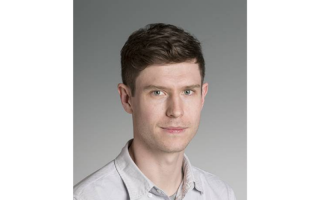
David Sim
Director of Undergraduate Teaching
Associate Professor of American History
Dr Tom Penfold: Spotlight on Research
Making the (Non)Scene
Any move to a new institution is fraught with apprehension and uncertainty in and amongst the excitement that comes with meeting new colleagues and new students. For me, starting a teaching focused position in the Department of History in August 2021, was no different. My focus has been on introducing a new undergraduate survey module covering South African history from the late nineteenth century to the present. However, alongside my time in the classroom, that uneasy jamboree of feelings one experiences when starting a new role provided renewed energy to Covid-stalled research.
My current research is, after all, underpinned by similar mixed emotions. Though in a constant contradiction of discussing a ‘collective’ of poets who are adamant in their separateness, I am investigating a group of South Africa poets I label the Poets of No Sure Place. At the heart of their poetry, though in terms of style and from extremely varied, is a shared desire to excavate the so-called newness of post-apartheid South Africa. Indeed, by tracing the perpetual sense of movement sketched in their verse, I shed light on the mixed emotions they experience living on the margins of the Rainbow Nation: Determined to be optimistic and keep faith in some sort of future there is still an increasing sense of despair – frustration at dreams not realised and promises not kept. That tension is nothing new for students of contemporary South Africa but, for me, highlighting their poetry is vital. It has for too long been side-lined by the literary establishment due to geographic location – New Brighton township is not a recognised literary metropolis – and for not fitting the prescribed political project. Yet, one small publisher took a chance in the late 1990s and brought to light something vibrant. It is that vibrancy, and the post-Rainbow form it births, that inspires me.
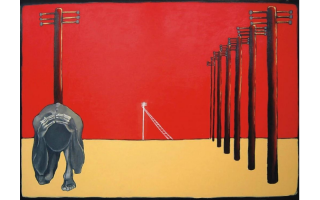
Research and UCL also mixed in another unexpected way as my first year in post progressed. Through conversations with students, it became obvious that UCL’s history curriculum was encouraging them to look critically at their own experiences of academic, to think through its shortcomings, and be proactive in addressing them (with a supportive department behind them). Thus, if my research is identifying failings in the South African literary establishment, of which the academy is part, were their ways I too, like my students, could challenge these proactively in a way that chimed with today’s particular moment? There were…
To return to the latest trends in South African culture, therefore, is too encounter the growing possibility of the ‘death of the text’. Critics claim that continuing racial oppression demands a move away from written literature. The change needed to decolonise society, the argument goes, is so radical that it can only be understood through live art. Yet, as my Poets of No Sure Place work has illustrated previously, and as my students themselves pointed out, if we broaden the academic gaze and look in unexpected places we can find unexpected things: things that challenge prevailing thought. This has prompted me to begin highlighting the presence of literary ‘non-scenes’ of impromptu performance such Poetry Slams and Open Mic nights. In doing so, it becomes evident that there is actually a new generation of literary activism intent on re-actualising the word and not subscribing to its death.
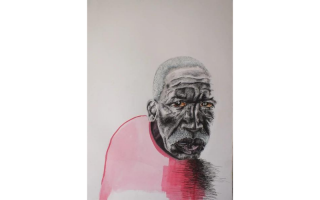
Such discoveries have prompted me to embark on a new project - prioritising external engagement - that involves working alongside poets known and unknown, new and old, who work across multiple disciplines. One result, in the not to distant future, will be a collaborative workshop event that proposes to both document and contribute to this current, and increasingly urgent, process of re-actualisation. “Making the (Non)Scene” will not only host a preliminary conversation in which artists share their thoughts about the broader place of poetry in the South African literary space. It will also provide an arena for those present to perform and create. Therefore, not only will a gap in current academic understanding, that of contemporary re-actualisation, be addressed but the academic space will also be ‘hijacked’ to become a non-scene in and of itself.
Our task as students, academics and, above all, historians is to similarly hijack convention. Learn from the past; shape the future.
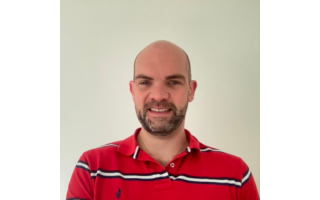
Tom Penfold
Associate Lecturer in African History
Artworks are by Dolla Sapeta - you can read an interview with him here: https://africainwords.com/2021/03/05/the-new-brighton-art-school/
Professor John Sabapathy: Spotlight on Research
UCL Anthropocene
One of the happier local stories of lockdown in the History Department was the development and launch of UCL Anthropocene, a network and virtual school across our Faculty addressing the idea that we don’t live in the Holocene anymore, but instead the ‘Anthropocene’, an epoch characterized by human actions operating at geological scales globally. This idea has come out of geology but has been far more widely influential across the humanities and social sciences and immediately raises the historical question of when the Anthropocene started (with the apex of nuclear testing last century; with the industrial revolution’s pollutants; with American reforestation and changed carbon levels caused by the genocidal ‘Colombian exchange’?). This way of thinking about human impacts on the planet and the historical processes which have produced them has opened out many more questions which colleagues are discussing, teaching and collaborating around, both in and outside of the Department. We have run a wide variety of events (recordings are here), including a large alumni evening, as well as ongoing seminar series (including ‘Anthropocene Histories’). Indeed, our most recent event in May (and our first in-person alumni event since the pandemic!) was a panel discussing disease and history—very topical for our zoonotic times.
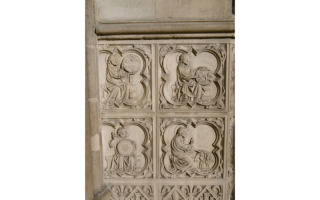
The nature of these questions means that collaborative interdisciplinary work is necessary and invaluable. One of the distinctive things about UCL Anthropocene has been the range of specialisms across the university we can mobilise, and the willingness of colleagues to work together on these questions. In these respects what UCL is able to do here is genuinely novel. We will, for instance, run a series of events with UCL’s the Institute of Archaeology and the Institute of Advanced Studies (where Nicola Miller andAntonio Sennis have key positions) around David Wengrow and David Graeber’s widely reviewed Dawn of Everything book this June. Our wider public work connects through to a range of departmental colleagues’ research agendas (you can see who’s involved here), as well as into our teaching. UCL has committed that all students will have the opportunity to study and be involved in sustainability by 2024. Many History Department modules already enable this, through teaching ranging from the environmental history of North America to that of the Himalayas. Colleagues have also contributed to a highly innovative module on ‘Comprehending Covid’ which brings together historians, anthropologists, geographers, sociologists, economists, and political scientists to analyse one of the defining events of our age. One large question raised by such issues is how history as a discipline should respond to such questions. Should historians concern themselves with more instrumental, ‘forwards facing’ research? Should history itself go beyond its traditionally homocentric concerns to incorporate other non-human actors, and how? These are large questions, and ones we raise for all students, right at the start of the degree (through the historiographical ‘Approaching History’ module), as well as later on (through e.g. my ‘Emergency History’ module).
There will be more work extending and continuing this work over the coming year. We are always interested in engaging with alumni on it. Many of you will be working in fields where these issues are being discussed. If you would like to hear more about our work, do please get in touch.
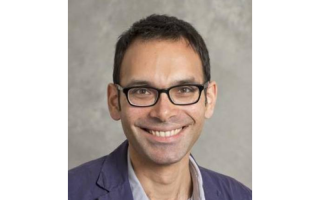
John Sabapathy (j.sabapathy@ucl.ac.uk)
Professor of Medieval European History
Co-convenor of IHR ‘Anthropocene Histories’ seminar
Lapis Student Zine: Spotlight on Students
The Lapis is a new zine launched by the History department as part of its Awarding Gap project. It is written and edited by undergraduates for their fellow students, as a point of connection for the department. We hope this will foster a sense of belonging amongst the student body, celebrate its diversity of talent, and showcase the different approaches to history present in our community.
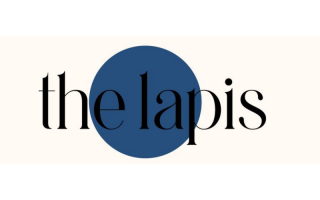
The zine features three sections: ‘Our Voices’, Academic History and Public History. ‘Our Voices’ seeks to combat the isolating feeling of belonging to such a large university, by giving a platform to students’ personal histories and experiences. The Academic History section aims to showcase the breadth of expertise present within the History department and different ways of approaching a given issue. We hope it will raise awareness of what’s on offer in the department and make thematic connections across modules. Finally, the Public History section is about exploring how history is made contemporary, personal and inclusive for everyone, and a chance to creatively engage with the subject.
The first issue debuted on the theme of roots. You can read it here: https://thelapisucl.wordpress.com/
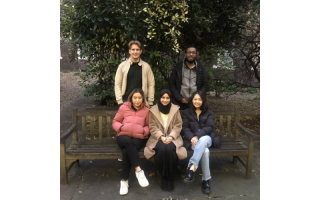
2021 - 2022 Lapis Team
A Week in the Life of a UCL History Student: Spotlight on Students
In this video, one of our students, Zahra, talks us through what a typical week as a UCL History students has looked like recently.
Jeremy Bowen: Spotlight on Alumni
When the Berlin Wall came down in 1989, seven years after I graduated from UCL with my newly minted BA degree, the twentieth century history I had spent a lot of time studying seemed to be part of an era that was well and truly over. Communism and Nationalism in Eastern Europe (optional subject in my second year) and The Great Powers 1945-54 (final year special subject) looked to be of less help than I might have hoped as a young foreign correspondent, as the world had changed. We were facing forward. Old certainties had gone. Courses I had taken that were held jointly in the School of Slavonic and East European Studies related to a country, the Soviet Union, that had subsided into the receptacle that Leon Trotsky, one of its founders, and victims, called the dustbin of history.
My thirtieth birthday party was a dinner under the dusty chandeliers of the bullet scarred Athenee Palace Hotel in Bucharest, not long after the dictator Nicolai Ceausescu was shot out of hand along with his wife. Romanian student revolutionaries checked identities at the door of the hotel, which was draped with national flags all with holes cut out of the centre to get rid of the hated symbols of communism.
As a matter of fact I was wrong about the utility of my study of history. For an ambitious young journalist it helped quite a bit to have an idea of how countries and people had arrived at the place I found them when I got off the plane.
This year, during long and hard months in Ukraine, all that has more than redoubled as the old world has come flooding back. Front line nations in Eastern Europe look back at their history and shudder. Their view of President Putin and his renewed invasion of Ukraine is very different to that of those parts of Europe that used to be on the other side of the old Iron Curtain. I’ve found that the study I did of the mid twentieth century is very helpful as we approach the second quarter of the twenty-first.
I can also remember those warnings that history is no predictor of the future. It does, I’ve found, help the kind of journalism I’ve done, lookingat the impact in the world of economic, social and political forces that swirl around the globe. Sadly, lots of people who should know better lack the perspective that history could have given them. I am not just talking about journalists. Most of our political leaders could do with it. It might counter the chronic short termism of western governments. President Putin dwells, some say obsesses about history, about the might of Russia and the urgent need to restore it. I am not arguing that is a positive force either, but western leaders might have understood him better had they themselves understood the power of the past.
One place where the power of history is fully understood is in the Middle East, and most notably in Jerusalem. A notable Israeli writer said once that Jerusalem is the only city where the dead are more important than the living. When Israel was celebrating the 30th anniversary of its victory in the 1967 Middle East war I asked a group of Palestinians sitting just inside Damascus Gate at a café about the determination of many Israelis to make occupation of the land captured in 1967 permanent.
‘The crusaders were here for a century, and then they had to leave’, said one of the tea drinkers. They were going to wait it out.
Equally, Jewish settlers in the occupied territories can dismiss centuries of events to signal out the moments they dwell upon. I asked a relatively recent Jewish arrival from Argentina whether he had more of a right to the land than the Palestinian farmers in the neighbouring villages whose ancestors had worked the land for centuries.
“Of course,” he said. “If the Romans hadn’t thrown us out, we’d never have left.” In his mind two thousand years later it was time to redress the balance.
I regret a few things about my time at UCL. I could have worked a bit harder to get my essays in on time. I could have gone to Shenley more often. What I don’t regret is the subject I studied.
Angela Leaney: Spotlight on Alumni
I’m honestly not quite sure how a medieval and modern history graduate of UCL who spent her formative years in Chelmsford ended up running an access control company in central New Jersey thirty years later.
It was certainly a far from linear path.
So many young people don’t know what they want to do or where they want to do it. Gifted with prescience and pretentiousness, I was lucky that had I decided, aged 11, the field and the firm where I would earn a living. Upon graduation in 1990, I landed a job in my chosen field at my chosen firm and started to find my way in advertising. I could not have anticipated just how useful the critical thinking skills I learned at UCL would be. In retrospect I am truly grateful. I’m sure my professors’ toes would curl in horror at how I applied academically-forged analytical skills to sell margarine and toilet cleaners. I had rent to pay.
After years of talking in conference rooms in London, Paris and Milan, I took a shot at a promotion for which my colleagues in London told me I was woefully underqualified. To universal surprise, I stubbornly proceeded to land the job, and on a whim, moved to LA in 2000. You cannot help but fall in love with LA – the Pacific Ocean was rolling around literally at the end of my street – but its pace was SO slow compared to London, that I jumped at a promotion into marketing a media start up in New York and was happy to be back in the dirt, noise and urban grind. I lost my fear of seeing rats scurry over garbage bags into drains. The cycle of life.
I had the opportunity to handle various creative and strategic management roles in marketing over the next few years. I marketed basketball, kids educational TV, ad tech, professional networking organizations, working on challenging assignments with really great team mates. I fell in love with working in America (the chutzpah, drive and optimism are infectious) then fell in love with an American entrepreneur who ran an access control company. I movedfrom the city, popped open my MacBook in central New Jersey, googled “cash flow projection” and took over running his business. It has been in equal parts satisfying and terrifying learning a new sector which technology is changing every day. Our team secures buildings, specializing in schools and university campuses. We are often called in when there is a breach or flawed system in place. It’s a serious responsibility to keep people feeling safe so that they can do their best work. Our team works in schools, museums, high rises, jails, sewage treatment plants, bank vaults, morgues using technology and solutions that did not even exist when I graduated. Our business is growing at a fair clip which is immensely gratifying.
Three lessons learned:
- Find and take the chance to work and live in another culture. You’ll unearth grit and curiosity you never thought you had.
- Work with funny people. They’ll make the bad days more tolerable and the good days more memorable.
- Impulsive decisions are the best decisions. I thought I had it all figured out aged 11, but every significant adventure and opportunity for personal and professional growth has come from me blurting out “yes!” at inopportune moments in fairly rapid succession ever since.
- Here’s a bonus fourth lesson learned. Don’t sneak “vox populi” into a Powerpoint presentation. No-one will understand you.
I’ve overstayed my welcome. I’ve exceeded my given 500 words for this piece. I’ll end with an invitation to email me at angela@hogansecurity.com if you think I can help you in your adventures.
Angela Leaney
CEO and majority owner Hogan Security Group, Corporate Board Director, happy graduate medieval and Modern History class of 1990.
Antonia Fitzpatrick: Spotlight on Alumni
I was a postgraduate at UCL’s History Department between 2007 and 2012, on the MA in Medieval Studies (2007-2008), and then as a PhD candidate supervised by Prof. David d’Avray (2008-2012). Afterwards, I took up a Junior Research Fellowship and then a Departmental Lectureship in Medieval History at St. John’s College, Oxford (2012-2018). I published a book (Thomas Aquinas on Bodily Identity, Oxford University Press, 2017) and co-edited, with UCL’s Prof. John Sabapathy, a second book, a collection of essays on the institutional contexts for medieval thought which included contributions from UCL’s Prof. d’Avray and Dr Emily Corran (Individuals and Institutions in Medieval Scholasticism, University of London Press, 2020).
In 2018, I decided to pursue a career as a barrister. Higher education in History is very good preparation for a career in the law. Although academic law (as I encountered it on the conversion course, at least) is quite different from academic history, there is a high degree of overlap between the practical skills needed to be a good historian and a good lawyer. In both cases, you need to be able to marshal complex factual evidence and to understand how to pitch an argument so that it is at its most persuasive. I would say that an education in Medieval History can be particularly helpful on the evidence side (depending on your area of legal practice), because it gives you rigorous training in how to draw inferences from incomplete evidential records. In my view, to really enjoy work at the Bar, you should enjoy public speaking. Several of my peers on the law conversion course had done quite a lot of debating but I found that my work teaching and lecturing was equally useful experience, and I won two mooting competitions: the Maitland Advocacy Prize in 2018 and the Administrative Law Bar Association moot in 2019.
I completed the Graduate Diploma in Law (2018-2019) and the Bar Professional Training Course (2019-2020) at City, University of London, supported by scholarships from City and Gray’s Inn, the Inn of Court of which I am a member. I was a student director of the School Exclusion Project, a pro bono initiative which provides representation to parents wishing to challenge state schools’ decisions to permanently exclude their children. Alongside the Bar Course I worked for Ofsted in relation to the Independent Inquiry into Child Sexual Abuse (IICSA). I know people who secured pupillage without doing any pro bono or paralegal work, but both gave me an understanding of the job that I could not have gained from another source. I think pro bono work is important, and I have taken on pro bono instructions since starting practice.
I was called to the Bar by Gray’s Inn in November 2020. Since October 2021 I have been a tenant at Monckton Chambers, where I completed pupillage in 2020-2021. Chambers is multi-disciplinary, specialising in Competition, Public, Procurement, and EU (now “EU relations”) law. Since starting I have principally worked as part of a team on various cases in those areas. I have been instructed as junior counsel: on behalf of claimants in various Competition Law matters including the trucks cartel damages litigation and in a class action claim against the price comparison website CompareTheMarket; on behalf of the Secretary of State for Health and Social Care, to defend Kellogg’s challenge to the Government’s regulations to restrict the promotion of less healthy foods in supermarkets and other large businesses and their online equivalents (now awaiting judgment); and on behalf of Siemens in its challenge to the HS2 rolling-stock procurement. I am co-author of the Competition Law chapter in the Second Edition of the Law Society/Tech London Advocates’ “Blockchain: Legal & Regulatory Guidance” (January 2022).
I work in Chambers rather than from home. Raymond Buildings (Gray’s Inn), where Monckton is located, is where Charles Dickens worked as a legal clerk. It was built in 1825, i.e. in the same decade in which Gordon Square, home to UCL’s History Department, was developed. I am really delighted to have ended up somewhere so close to the place where I spent five very happy years as a postgraduate student.
Recent Publications from UCL History
Royal Childhood and Child Kingship: Boy Kings in England, Scotland, France and Germany, c. 1050–1262 by Emily Joan Ward
August 2022 sees the publication of Dr Emily Joan Ward’s first monograph, Royal Childhood and Child Kingship: Boy Kings in England, Scotland, France and Germany, c. 1050–1262, with Cambridge University Press. Dr Ward is a British Academy Postdoctoral Researcher and finished her book during her time at UCL between January 2021 and July 2022. Refining adult-focused perspectives on medieval rulership, Royal Childhood and Child Kingship exposes the problematic nature of working from the assumption that kingship equated to adult power. Children’s participation and political assent could be important facets of the day-to-day activities of rule, as this study shows through an examination of royal charters, oaths to young boys, cross-kingdom diplomacy and coronation. The first comparative and thematic study of child rulership in this period, Ward analyses eight case studies across north-western Europe from c.1050 to c.1250. The book stresses innovations and adaptations in royal government, questions the exaggeration of political disorder under a boy king, and suggests a ruler’s childhood posed far less of a challenge than their adolescence and youth. Uniting social, cultural and political historical methodologies, Ward unveils how wider societal changes between the eleventh and thirteenth centuries altered children’s lived experiences of royal rule and modified how people thought about child kingship.
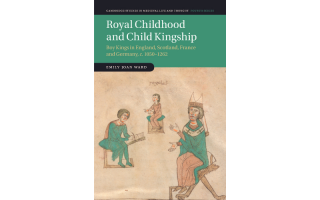
More information
About the author: Emily Joan Ward is a British Academy Postdoctoral Fellow at UCL History.
Heritage Weekends: 52 breaks exploring Britain’s past by Neil and Helen Matthews
Heritage Weekends: 52 breaks exploring Britain’s past is published in July. It’s a guidebook covering 52 places around Britain where you can explore history and heritage, whether that is natural, architectural, industrial or cultural, from the Prehistoric era, through ancient, medieval, Tudor, Georgian, Regency and Victorian times to the 20th century. Some places are neglected or under-rated and deserve more attention. Others are famous locations waiting to be enjoyed from new perspectives. As well as detailed descriptions of the sites, Heritage Weekends includes suggested itineraries, directions and top tips for accommodation and eating out. England, Wales, Scotland, Jersey and the Isle of Man are all covered, with weekends divided into in-depth and shorter entries. All weekends include detailed information on how to get there, as well as suggestions for further places to visit if the reader has time to spare.
More information
About the authors: Neil and Helen Matthews are both UCL History Alumni; Helen is the Director of Academic Services at UCL.
Reflections
UCL History Department: Contemporary History
By Emeritus Professor, David D'Avray
What shapes an academic department like ours? For this writer, first and foremost the students. I still cannot believe my luck in spending a career teaching UCL History students. They – you – proved to be so intelligent that most of my research ideas have taken shape in conversation with them. If my later years have been productive of research, it has been thanks to that opportunity. They are an elite but less full of themselves than elite students easily become. Perhaps they have too much to handle, their academic work being the least of it as they grow up fast and deal with difficult landlords, plumbers, and very often the need to work part time to make ends meet. It used to be said even when I was young that perhaps the limits of young people capable of benefitting from a university education were being reached. Even though student numbers increased three times over during my teaching career, my own experience did not at all bear out the gloomy prognostications and I virtually never had a student in one of my classes who was not interesting to teach. (From what I hear, the further increases in the last three years have not lead to a significant drop in quality.) Furthermore, for reasons briefly noted below, MA teaching was much more important in the second half of may career than before, and the quality of the medievalists on the Medieval and Renaissance Studies programme has been fantastic. An amazingly large proportion of them went on to do funded research. As for undergraduates, in the last decade or so the internationalisation of the undergraduate body was a fresh source of talent. Brexit has put that into reverse but in fact the Department had students from all over the world.
As well as by its students, a department like ours is shaped by the approach of the teachers - my colleagues - Heads of Department, and – the Government; by the Government to a huge extent. I’ll focus on the influence of the Government. The developments sketched in the previous paragraph - the increase in numbers and the importance of Masters courses – all result from government policy. Towards the end of the last century the Government noted that too few State-funded doctoral students were completing PhDs in three or four years, or at all. An MA was made more or less a precondition for a PhD. So Masters students became a key element in the Department, and a link with doctoral students. Incidentally the last quarter century has been a golden period for PhD students in medieval history in the Department, as we began to attract gifted young graduates from Oxford and Cambridge, as well as keeping some of our own brilliant graduates. The increase in numbers of undergraduates came in two stages. The first was a directed policy, in the 1990s. At that time the Government paid undergraduate fees, indirectly through local authorities. Then more recently the burden of student fees was shifted to students, assisted by loans, but shortly afterwards State control of numbers was removed, so that the best departments could take as many students as they could manage. Good departments like ours opted to take a lot, appointing new staff also though not, it must be said, in proportion. A professionalisation of the administrative staff – notably, a professional Departmental Tutorship - and a great increase in their numbers was another consequence.
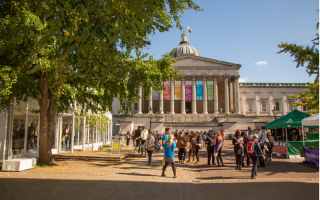
Despite the increased teaching load, the department’s research culture remained intense. This was partly thanks to wise recruitment, entirely international, so that new appointments were made of German, Austrian, Italian, Israeli, Turkish and U.S. scholars. The famous government research assessment exercises also encouraged even colleagues with full professorships and no need to work for promotion to get theirresearch finished and published, though they would have done so anyway in a department like ours. Another consequence of government policy was a new, ‘research project’ culture. The Government encouraged this by making research projects a factor in research assessment exercises, and by giving huge ‘on-costs’ to projects. The background thinking was a desire to encourage research without taking on a commitment to pay salaries for life. It is the model in the Natural Sciences, though with them it is easier for a researcher to find a new project when the one that employs them finishes. A final strand of government policy has been encouragement of impact and public engagement. Though we academics like to think we are an independent lot, it has to be said that we have dutifully done what government policy (common to both main parties) wanted in all these respects, because funding depends on it and also, to be fair, because the objectives have a lot to be said for them.
A more indirect result of government policy was an expansion of the range of fields covered by the Department. A official report decades ago had recommended that the Federal University of London be broken up, de facto if not de iure, into individual universities: UCL, Kings, QM, and Royal Holloway being the most important (Imperial had gone its separate way still earlier). Smaller colleges, Westfield and Bedford, were merged into larger ones. It was brutal but, in hindsight, it made sense given the expansion of numbers. When I started, teaching in a federal university system, the colleges were already much larger than those of Oxford and Cambridge Colleges, but now they are much larger than those universities as wholes. Most students this century think of UCL as ‘the University’ and are hardly aware that the Federal University still has a shadowy existence. In fact it is not so shadowy in all respects. Facts on the ground are the great Senate House Library, and the Senate Institutes, which are for a bringing together researchers from all the colleges. At Masters level too the Federal University of London remains a reality, allowing for free movement of students to courses in other colleges.
So far as undergraduate teaching is concerned, a consequence of the disaggregation of the ‘University of London’ was the our Department came to rely less on other Colleges. Previously, students who wanted to study African or Asian History went to SOAS. Now, UCL started making its own appointments in those fields – though a determined undergraduate can still take even an course in another college, and free exchange continues so far as specialised courses are concerned.
Another consequence however that I did not anticipate at the time when we withdrew from the Federal degree system was a new freedom to teach broad courses that could lead into ambitious research books. A Federal degree is by nature very conservative intellectually, because examiners have to be fair to students from a range of colleges and ask familiar questions. If they add fresh questions, nobody tackles them. When the course teacher is in charge of the examining, there are indeed dangers of students learning how to please him or her, but the gain in terms of intellectual freedom and the integration of teaching with research outweighs any disadvantages. Teachers in a federal system get bored in the second half of their career with the all too familiar ‘papers’. Fortunately, by the second half of my career, all I needed to do to freshen up was to put on a new course. Thus I was able to teach History and Sociology of Rationalities, Marriage and Monarchy, and Social Systems, all of them year long and taught in the combination of lectures and seminars which is probably the most effective way of getting students and their teachers to think. Those courses all became books, under different names, and all the books included sincere acknowledgments to UCL students.
Recent & Upcoming Events
May 2022 Alumni Event: UCL Historians on Disease and History
On 12th May we were very happy to hold our first in person alumni event for a couple of years. Thank you to all those in the alumni community who joined us in person and online. We heard three brilliant short talks on the topic of ‘Disease and History’ and the Q&A was followed by a drinks reception in the North Cloisters.
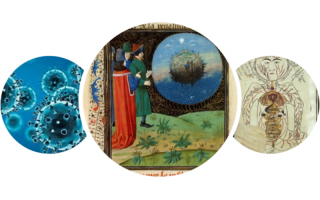
Professor Vivienne Lo spoke about The Healing Arts across Medieval Asia, Dr Elaine Leong’s contribution was on Medicine, Technology and the Everyday in Seventeenth-Century London and Professor John Sabapathy took us up to the present with Fast and slow pandemic violence: zoonotic diseases and their environments between the thirteenth and twenty-first centuries.
The roundtable discussion and Q&A ranged from thinking about exchanges of scientific and medical knowledge along the Silk Road to medical entrepreneurship in early modern London and how to characterise the violence of pandemics. It was wonderful to see so many staff, students and alumni from different generations at the reception and we very much hope that you will join us for events in the next academic year.
This event was live streamed and you can watch the recording here:
Upcoming Events in the 2022-23 Academic Year
- The Neale Lecture in English History will be given on November 15th 2022 by Professor Craig Muldrew, an expert on 16th and 17th century money, economy and society. The Neale Lecture is an annual public lecture given since 1970 in memory of Sir John Neale on topics in British history.
- In the summer term we will invite members of our alumni community to another cross-period roundtable with three historians working on different periods and regions of the world. Current topics under consideration are ‘populism’ and ‘corruption’ but please do write in with suggestions for the roundtable, and any other alumni event queries to sophie.page@ucl.ac.uk. I hope you have a very enjoyable summer and we look forward to seeing you in the next academic year.
 Close
Close

